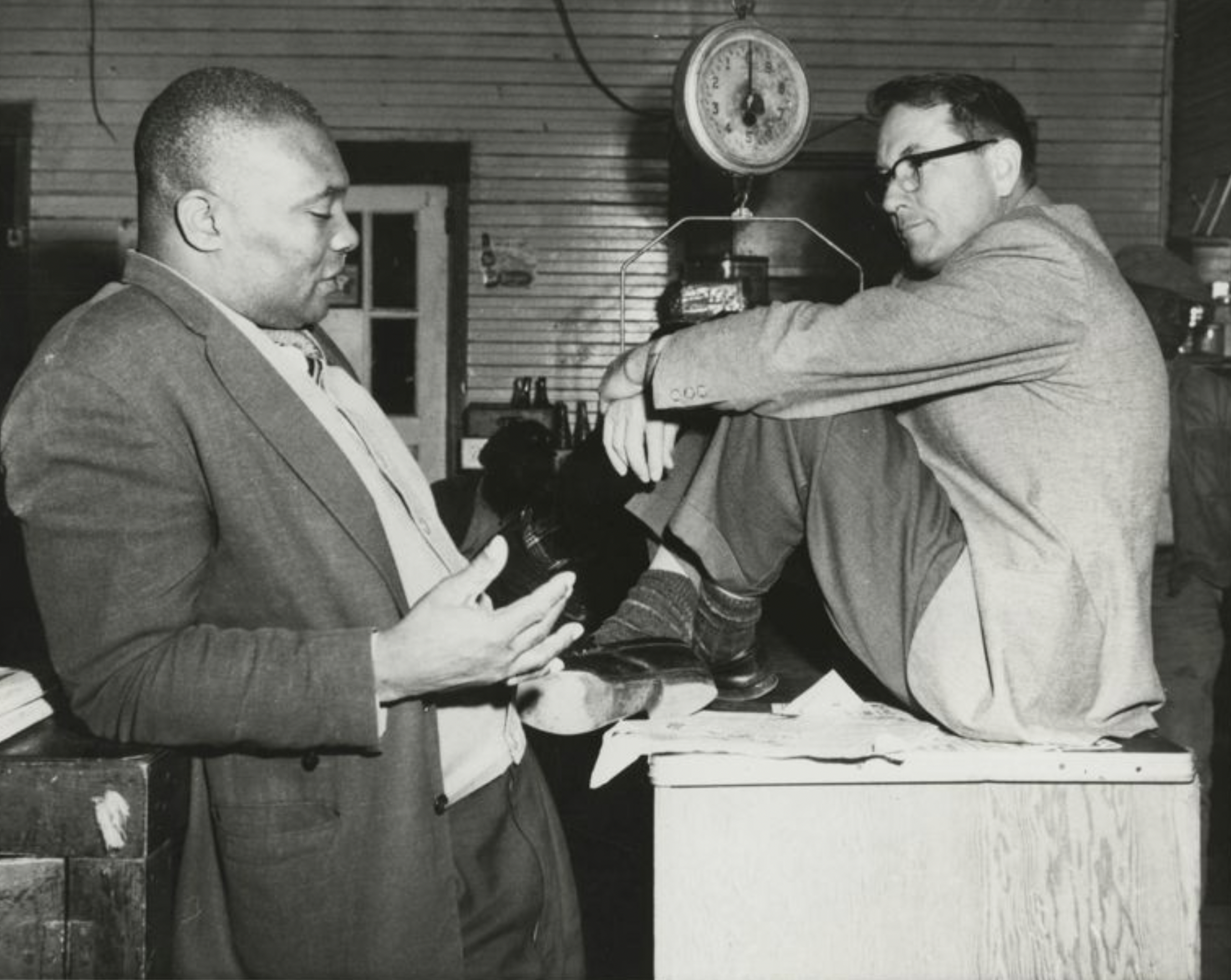By Lynn Burnett
Image: Myles Horton with Esau Jenkins.
Myles Horton was born in 1905, to loving, impoverished parents in Tennessee. His mother and father had both been educators, but when new teaching standards were passed that required teachers to have a high school education, they lost their jobs and became factory laborers. His parents, however, continued to organize classes for members of the community.
Myles left home at fifteen to work in a sawmill, and then as a packer in factories. There, he was exposed to unions, and became an organizer. He continued his labor organizing when he entered college in 1924. While in college, he also taught Bible classes. During one of the sessions, a group of rural workers told Myles about the difficulties they faced, and looked to him for answers. He had none, but asked the group to share more about their experiences. By creating a space for sharing, reflecting, and listening, the participants were able to discover their own solutions.
This was a moment that would shape the rest of Myles Horton’s life: by the late 1920s he was envisioning creating an educational space for the poor and working class people of Appalachia, geared towards helping communities wrestle with the problems that were the most important to them. This led him to travel to Denmark in 1931 and study the Danish folk schools, which were centered on the lived experiences and concerns of students. Myles’ thinking was influenced by these school’s informality, focus on community problem solving, and culture building.
In 1932, Myles Horton rented a small farm in the Appalachian Mountains, where he co-founded the Highlander Folk School. Poor and working class Southerners would attend workshops and discussion groups, with the purpose of sharing their own experiences and ideas with one another and generating solutions. They were then encouraged to go back to their communities and put those solutions into practice… and perhaps return to Highlander for further rounds of reflection and refinement in their search for solutions to the problems they cared about. Highlander soon became a center for labor organizing… and for combatting the racism that divided working-class people from mobilizing and working together.
In 1944, Highlander hosted its first integrated workshops. As momentum for the civil rights movement picked up in the early 1950s, Highlander shifted to become a civil rights training ground. Rosa Parks attended sessions before the Montgomery bus boycott, and after the boycott, Martin Luther King began using Highlander as a retreat and training ground for his organization. Most importantly, the ethos of Highlander had a huge impact on the Student Nonviolent Coordinating Committee: influenced by trainings at Highlander, SNCC members organized Black communities throughout the South not by telling people how to organize… but through deep listening and sharing, through which communities were able to organize themselves and develop local, sustainable leadership and movement community.
Myles Horton continued to direct Highlander until 1973. Highlander remains a vital organizing center to this day.
Additional Resources
Books
Frank Adams & Myles Horton: Unearthing Seeds of Fire: The Idea of Highlander.
John M. Glen: Highlander: No Ordinary School.
Aimee Isgrig Horton: The Highlander Folk School: A History of Its Major Programs, 1932-1961.
Myles Horton:
Myles Horton and Paulo Freire: We Make the Road by Walking: Conversations on Education and Social Change.
Stephen Preskill: Education in Black and White: Myles Horton and the Highlander Center’s Vision for Social Justice.
Kim Ruehl: A Singing Army: Zilphia Horton and the Highlander Folk School.
Stephen A. Schneider: You Can’t Padlock an Idea: Rhetorical Education at the Highlander Folk School, 1932–1961.
Articles
Robert Hunt Ferguson: Myles Horton, Highlander, and the Beloved Community.
Highlander chronology of Myles Horton and Highlander.
MLK Institute profile of Highlander.
SNCC Digital Gateway entries for Myles Horton and Highlander.
Wikipedia entry.
Video
Bill Moyers: Myles Horton – Radical Hillbilly – A Wisdom Teacher for Activism and Civic Engagement.
